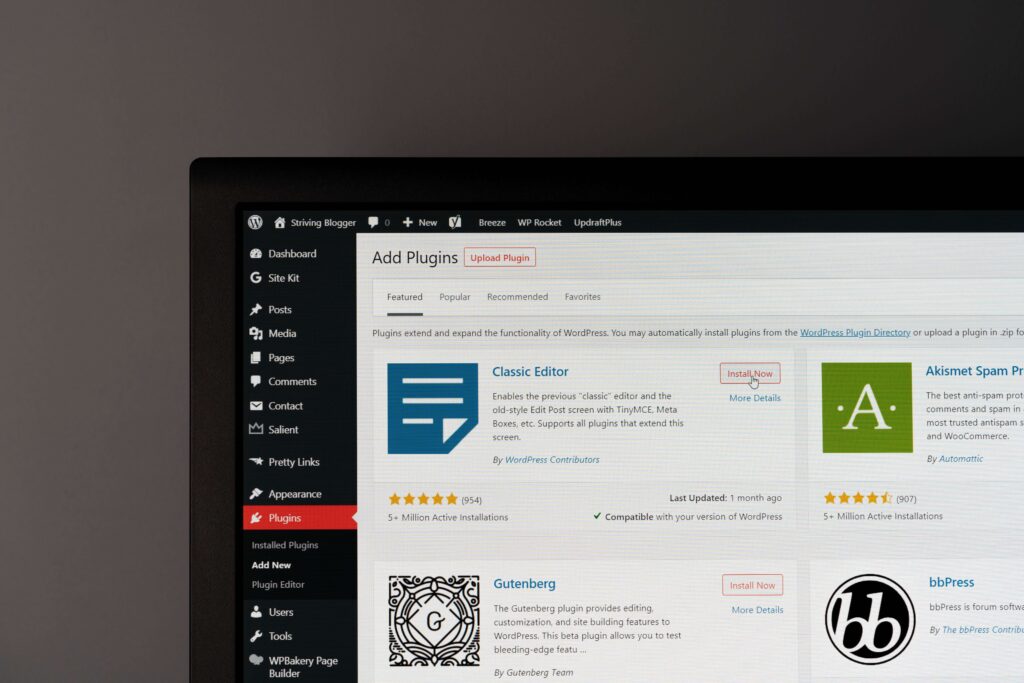WordPress is a powerful and versatile content management system (CMS) that has become the go-to platform for building websites of all types. Whether you’re creating a personal blog, an e-commerce site, or a corporate webpage, WordPress provides the tools and flexibility you need. However, for beginners, it can be a bit overwhelming. This article aims to simplify the journey for newcomers by offering essential development tips for mastering WordPress.
1. Choose the Right Hosting Provider
Your WordPress journey starts with selecting the right hosting provider. Opt for a reliable and reputable host that offers good server performance, security, and excellent customer support. Some popular options include Bluehost, SiteGround, and WP Engine.
2. Keep Your WordPress Core, Themes, and Plugins Updated
WordPress frequently releases updates to enhance security and functionality. Always keep your core installation, themes, and plugins up to date to ensure your website remains secure and runs smoothly.
3. Understand the Importance of Themes
WordPress themes control the look and layout of your website. Choose a responsive, mobile-friendly theme that aligns with your website’s purpose. Premium themes often provide better customization options and support.
4. Use Plugins Wisely
Plugins extend WordPress’s functionality, but too many can slow down your site and create security vulnerabilities. Only install plugins that you truly need, and make sure they come from reputable sources.
5. Secure Your Website
Security is paramount. Use strong, unique passwords, and consider installing a security plugin like Wordfence or Sucuri. Regularly backup your website, and be prepared to restore it in case of an attack.
6. Optimize for SEO
Search engine optimization (SEO) is crucial for visibility. Install an SEO plugin like Yoast SEO or Rank Math to help optimize your content for search engines. Focus on keywords, meta tags, and high-quality content.
7. Create Quality Content
Content is king. Consistently publish informative and engaging content relevant to your audience. Use clear headings, bullet points, and images to make your content reader-friendly.
8. Learn Basic HTML and CSS
While you don’t need to be a coding expert, having a basic understanding of HTML and CSS can be incredibly beneficial. It allows you to make small customizations and troubleshoot issues.
9. Customize Permalinks
WordPress generates automatic permalinks (URLs) for your posts and pages. Customize them to make them more user-friendly and include relevant keywords.
10. Implement Backup and Restore Solutions
Regularly back up your website to ensure you can recover it in case of data loss or hacking. Many hosting providers offer backup solutions, or you can use plugins like UpdraftPlus.
11. Optimize Images
Large, unoptimized images can slow down your website. Use image compression tools or plugins to reduce file sizes while maintaining quality.
12. Utilize Categories and Tags
Organize your content effectively by using categories and tags. This helps both visitors and search engines navigate your site.
13. Monitor Website Performance
Regularly check your website’s performance using tools like Google PageSpeed Insights or GTmetrix. Optimize your site based on their recommendations to improve speed.
14. Enable Caching
Caching plugins like W3 Total Cache or WP Super Cache can significantly speed up your website by storing static versions of your pages for faster loading.
15. Utilize Social Media Integration
Promote your content on social media platforms by integrating social sharing buttons and auto-posting plugins.
16. Mobile Optimization is a Must
Ensure your website is mobile-responsive, as a significant portion of internet users accesses websites from mobile devices.
17. Set Up Google Analytics
Install Google Analytics to monitor your website’s traffic, user behavior, and other valuable insights.
18. Engage with Your Audience
Respond to comments, emails, and social media interactions. Building a community around your website can boost engagement.
19. Learn from Online Resources
There are numerous online resources, including blogs, forums, and video tutorials, that can help you expand your WordPress knowledge.
20. Practice Regular Maintenance
Maintain your website regularly by deleting unnecessary files, cleaning your database, and optimizing your content.
Conclusion
Mastering WordPress is an achievable goal for beginners. By following these essential development tips, you’ll be well on your way to creating a secure, optimized, and engaging website. Remember that continuous learning and improvement are key to success in the world of WordPress development. Embrace the journey, and your skills will grow alongside your website.







